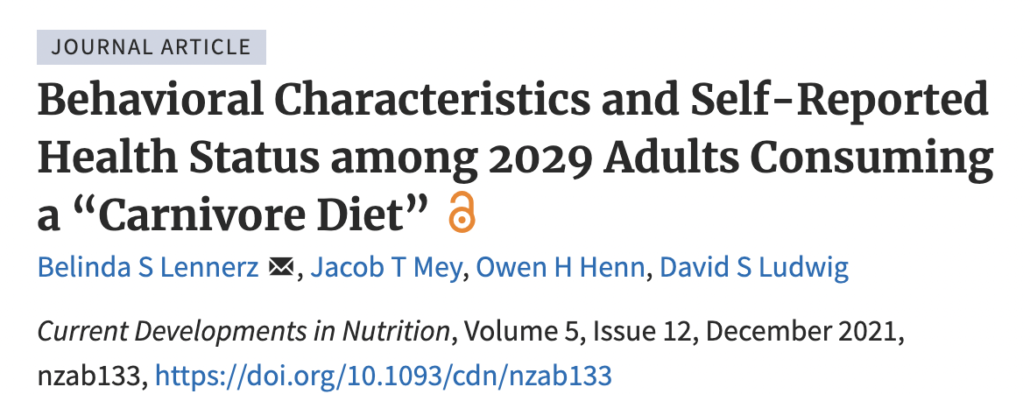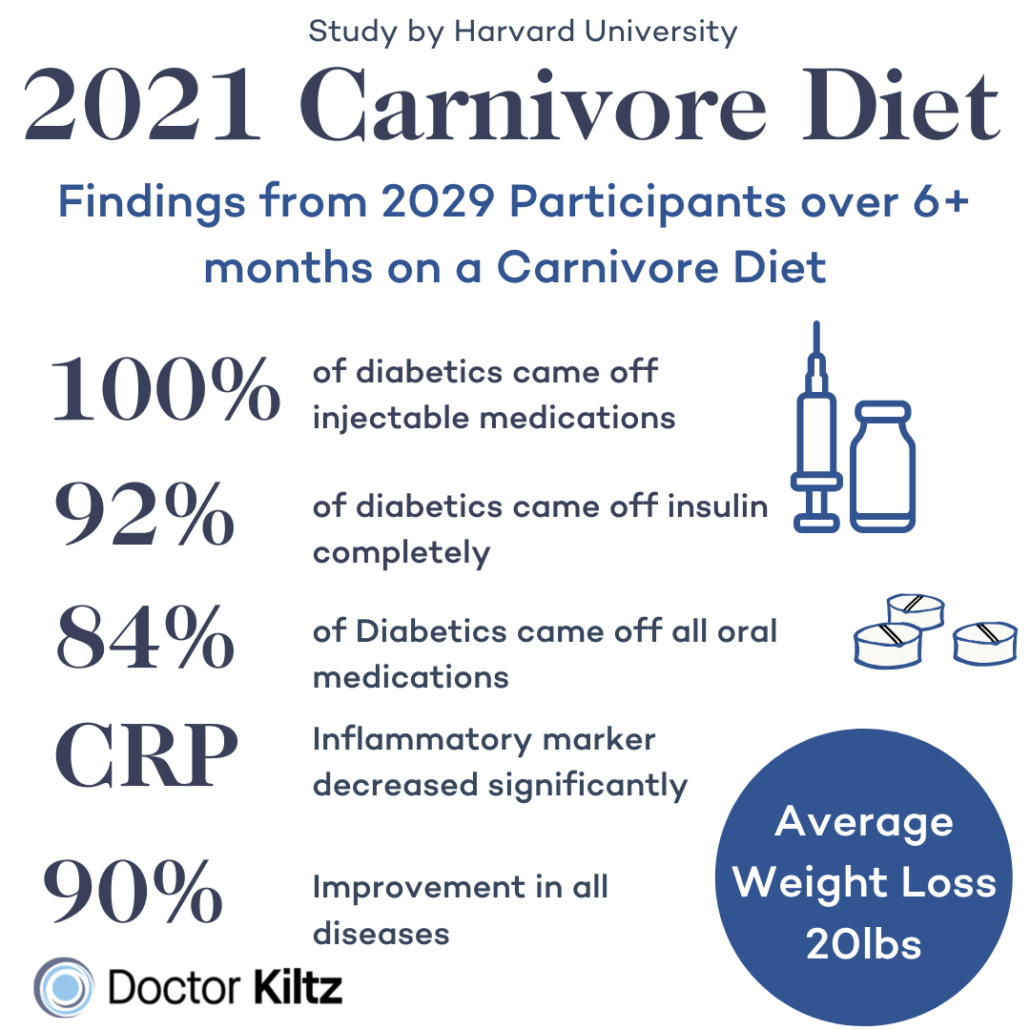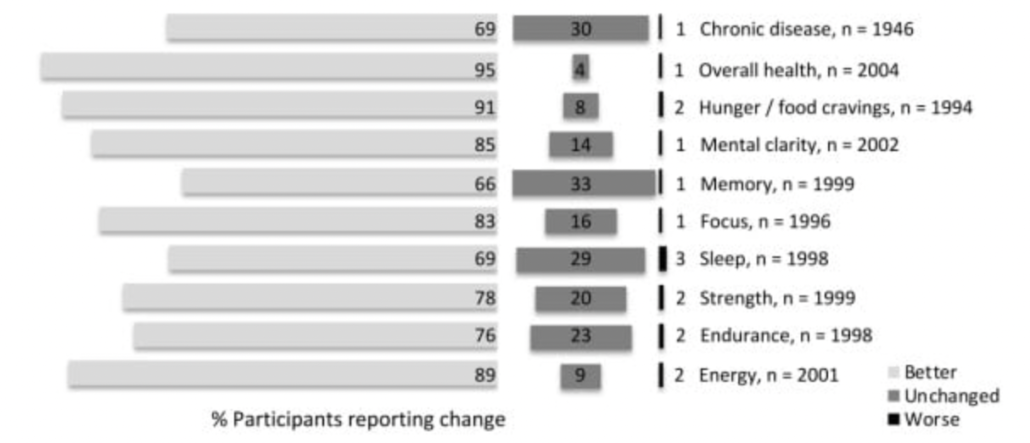We include products in articles we think are useful for our readers. If you buy products or services through links on our website, we may earn a small commission.
The Harvard Carnivore Diet Study: Findings and Takeaway

In 2020 a team of researchers at Harvard University conducted the first mainstream study on the carnivore diet. The study surveyed over 2000 carnivore dieters. And the findings were published on 2 November 2021 in Current Developments in Nutrition.

The fact that such a renowned institution took this radical diet seriously is a testament to its rapidly growing popularity and the experiences of influential adopters.
Podcaster Joe Rogan, psychologist Jordan Peterson, and popular doctors including Dr. Kiltz, Dr. Ken Berry, and Dr. Shawn Baker, all practice and promote the carnivore diet as a foundation of health and wellness.
In this article, we’ll explore the details of who was involved, what they ate, key findings with regard to effects on health, and the conclusions drawn of the Harvard carnivore study researchers.
Table of Contents
Who are the Researchers?
Study authors included:
- Belinda Lennerz, MD, Ph.D. Assistant Professor of Pediatrics at Harvard Medical School, and attending physician at the Division of Endocrinology, Boston Children’s Hospital
- Owen Henn, MS, RD, LDN. Dietician and researcher at Boston Children’s Hospital
- David Ludwig, MD, Ph.D. Professor of Pediatrics at Harvard Medical School, and Professor of Nutrition at Harvard School of Public Health, and endocrinologist and researcher at Boston Children’s Hospital,
- Jacob Mey, Ph.D. Researcher at Pennington Biomedical Research Center, Lousiana State University
Who were the participants?
Originally 3883 participants were recruited from carnivore diet communities on social media outlets, including Reddit, Instagram, Facebook, and Twitter.
Of the original respondents, 1,854 were excluded for various reasons, including age and duplication. The study included responses from the 2,029 remaining participants.
Nationality
- 64% of participants were from the United States and Canada
- 11% from Europe
- 8% from Australia
Sex
Two-thirds of the participants were male. One-third were female.
Age
Participants’ ages ranged from 18 to 85. The median age was 44.
Weight
Participant body weight ranged from 38 kg to 176 kg (84 lb to 388 lb)/
The median weight was 76 kg (168 lb).
Education
64% of participants had at least a college education.
Income
20% of respondents reported high income, 66% middle income, and 14% were low income.
Why did they begin the carnivore diet?
The vast majority (93%) of participants stated that they started the carnivore diet to improve health and lose weight.
What health reasons?
Under health reasons, the participants cited the following specific areas:
- Body weight/body composition 78%
- Focus and energy 74%
- Allergy/skin/autoimmunity 56%
- Digestive health 52%
- Athletic performance 46%
- Mental health 45%
- Diabetes 11%
How long have participants practiced the carnivore diet?
All participants had to have been practicing a carnivore diet for at least 6 months.
Participants reported being on the carnivore diet ranging from 6 to 337 months (28 years!).
The median length of reported time on carnivore was 14 months.
What foods did they eat on the carnivore diet?
Ruminant (red) meat
The most common carnivore diet food was ruminant meat.
- 85% of respondents reported consuming either or a combination of beef, bison, lamb, goat, and venison at every meal or at least daily.
Eggs and High Fat Dairy
The other most popular diet foods that participants ate daily or at every meal included:
- Eggs: 44%
- Cheese and cream 43%
Pork
- 13% of the participants reported eating pork at least once a day.
- 53% reported consuming pork one to a few times a week.
Poultry
- 2.5% reported consuming poultry at least once a day
- 38% consumed poultry weekly.
Fish
- 3.5% consumed fish daily
- 36% consumed fish weekly
Organ meat
- 42% of participants reported consuming organ meats at least once a week
Bone Broth
- 52% of participants consumed carnivore diet bone broth at least monthly
Milk
- 17% of participants reported consuming milk at least once a week
- 65% reported never consuming milk while on the carnivore diet
Herbs and Spices
- 21% of participants reported using herbs and spices daily.
Salt
- 36% of the participants consumed salt liberally
- The remainder reported low to medium salt intake
Fat content of meat
- 61% consumed high-fat meat
- 37% chose moderate fat
- 2% chose lean
Meat quality
- 54% of participants consumed 100% grain-finished or predominantly grain-finished.
- 46% consumed 100% grass-fed and finished or predominantly grass-fed and finished
Doneness of meat
- 45% liked medium rare
- 29% liked rare
- 15% liked medium
- 6% liked medium well.
- 2% liked raw
What participants drank on the carnivore diet
Coffee and Tea
- 57% of participants reported drinking coffee at least daily
- 24% reported never drinking coffee
- 12% reported drinking tea at least daily
- 51% reported never drinking tea
Alcohol
- 83% never consumed beer
- 86% never consumed low-carb beers/seltzers
- 55% never consumed spirits
- Of the 45% who consume spirits, only 0.5% drank at least daily. 10% had it once to a few times a week. The remainder drank spirits sparingly
Wine
- 57% never consumed wine.
- 43% consumed wine
- Of the 43% only 1.1% drank wine daily, and 11% drank wine once to a few times a week
Electrolyte Supplements
- 59% never used electrolyte supplements
- 17% consumed electrolyte supplements daily
- 24% used them from a few times a year to a few times a week
How often did participants eat on the carnivore diet?
- 81% of participants ate one to two meals a day
- 64% ate two meals a day
- 17% ate only one meal a day
- 17% ate three times or more a day
- 2% ate less than once a day
Levels of Compliance
Compared to most diets, carnivore dieters reported a very high level of compliance across various categories:
- 89% never consumed legumes
- 87% never consumed breaded and fried fast food meats
- 81% never consumed candy & milk chocolate
- 80% never used multivitamin supplements.
- 79% never consumed grains
- 78% never consumed sugar
- 75% never ate desserts
- 74% never consumed honey
- 74% never consumed starchy vegetables
- 69% never consumed non-starchy vegetables
- 66% never consumed fruit
- 65% never consumed non-calorie sweeteners
What did participants experience on the carnivore diet?
Based on the data, researchers concluded that “Contrary to common expectations, adults consuming a carnivore diet experienced few adverse effects and instead reported health benefits and high satisfaction.” [9]

Here are some more findings
Self-reported changes in health status

Source: Belinda S Lennerz, Jacob T Mey, Owen H Henn, David S Ludwig, Behavioral Characteristics and Self-Reported Health Status among 2029 Adults Consuming a “Carnivore Diet”, Current Developments in Nutrition, Volume 5, Issue 12, 2021,
The self-reported changes in health status were overwhelmingly positive:
- 95% improved overall health
- 91% improved hunger/food cravings
- 89% improved energy
- 85% improved mental clarity
- 83% improved focus
- 78% improved strength
- 76% improved endurance
- 69% improved sleep
- 69% improved chronic disease
- 66% improved memory
How chronic conditions changed
- 98% improved or resolved diabetes and insulin resistance
- 97% improved or resolved gastrointestinal conditions
- 96% improved or resolved musculoskeletal issues
- 96% improved or resolved psychiatric symptoms
- 93% improved or resolved overweight/obesity (mean BMI decreased from 27.2 to 24.3)
- 93% improved or resolved hypertension
- 92% improved or resolved urologic issues
- 92% improved or resolved dermatologic issues
- 89% improved or resolved autoimmune conditions
- 84% improved or resolved cardiovascular issues
How medication use changed
- 100% discontinued other diabetes injectables
- 92% discontinued insulin for type 2 diabetes altogether
- 90% discontinued or decreased insulin
- 84% discontinued oral diabetes medications.
Level of satisfaction with the carnivore diet
- 98% of participants reported being very satisfied or satisfied
Study limitations
This study was based on self-reported responses to an online survey.
Recalling what exactly one eats in a week, month or year is notoriously difficult.
And there is no way to objectively verify the accuracy of self-reported eating habits and health outcomes.
The Takeaway From the Harvard Carnivore Study
In the context of a grain-based society where meat is demonized and plant foods are lauded as the key to health, the idea that eating an all-meat diet is healthy, let alone possible, seems radical.
However, numerous studies show that high-fat, low-carb animal-based diets are how our ancestors evolved eating over nearly 2 million years.3
For these reasons, it’s important that a reputable and notable institution like Harvard take the carnivore diet seriously.
Though the outcomes of the Harvard carnivore study likely come as no surprise to carnivore dieters, the overwhelmingly positive responses should compel further studies that will corroborate these reports and elevate the carnivore diet further into mainstream consciousness.




















